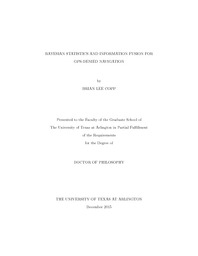
ATTENTION: The works hosted here are being migrated to a new repository that will consolidate resources, improve discoverability, and better show UTA's research impact on the global community. We will update authors as the migration progresses. Please see MavMatrix for more information.
Show simple item record
| dc.contributor.advisor | Subbarao, Kamesh | |
| dc.creator | Copp, Brian Lee | |
| dc.date.accessioned | 2016-01-26T22:45:12Z | |
| dc.date.available | 2016-01-26T22:45:12Z | |
| dc.date.created | 2015-12 | |
| dc.date.issued | 2015-11-24 | |
| dc.date.submitted | December 2015 | |
| dc.identifier.uri | http://hdl.handle.net/10106/25435 | |
| dc.description.abstract | It is well known that satellite navigation systems are vulnerable to disruption due to jamming, spoofing, or obstruction of the signal. The desire for robust navigation of aircraft in GPS-denied environments has motivated the development of feature-aided navigation systems, in which measurements of \textit{environmental features} are used to complement the dead reckoning solution produced by an inertial navigation system. Examples of environmental features which can be exploited for navigation include star positions, terrain elevation, terrestrial wireless signals, and features extracted from photographic data. Feature-aided navigation represents a particularly challenging estimation problem because the measurements are often strongly nonlinear, and the quality of the navigation solution is limited by the knowledge of nuisance parameters which may be difficult to model accurately. As a result, integration approaches based on the Kalman filter and its variants may fail to give adequate performance.
This project develops a framework for the integration of feature-aided navigation techniques using Bayesian statistics. In this approach, the probability density function for aircraft horizontal position (latitude and longitude) is approximated by a two-dimensional point mass function defined on a rectangular grid. Nuisance parameters are estimated using a hypothesis based approach (Multiple Model Adaptive Estimation) which continuously maintains an accurate probability density even in the presence of strong nonlinearities.
The effectiveness of the proposed approach is illustrated by the simulated use of terrain referenced navigation and wireless time-of-arrival positioning to estimate a reference aircraft trajectory. Monte Carlo simulations have shown that accurate position estimates can be obtained in terrain referenced navigation even with a strongly nonlinear altitude bias. The integration of terrain referenced and wireless time-of-arrival measurements is described along with preliminary results. In addition, a new Bayesian algorithm for visual navigation by feature tracking is presented. Finally, a unified framework for integration of feature-aided positioning techniques using Bayesian statistics is described. | |
| dc.format.mimetype | application/pdf | |
| dc.language.iso | en_US | |
| dc.subject | GPS denied navigation | |
| dc.subject | Terrain referenced navigation | |
| dc.subject | Time of arrival positioning | |
| dc.subject | Bayesian estimation | |
| dc.subject | Bayesian statistics | |
| dc.title | Bayesian Statistics and Information Fusion for GPS-Denied Navigation | |
| dc.type | Thesis | |
| dc.date.updated | 2016-01-26T22:47:19Z | |
| thesis.degree.department | Mechanical and Aerospace Engineering | |
| thesis.degree.grantor | The University of Texas at Arlington | |
| thesis.degree.level | Doctoral | |
| thesis.degree.name | Doctor of Philosophy in Aerospace Engineering | |
| dc.type.material | text | |
| dc.creator.orcid | 0000-0002-8235-3656 | |
Files in this item
- Name:
- COPP-DISSERTATION-2015.pdf
- Size:
- 3.385Mb
- Format:
- PDF
This item appears in the following Collection(s)
Show simple item record


